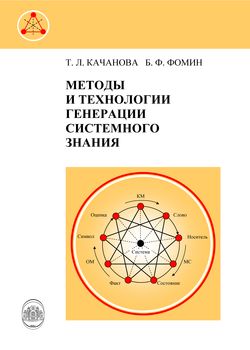Kachanova T.L., Fomin B.F. Methods and technologies of generating system knowledge (In Russian)
 Kachanova T.L., Fomin B.F. Methods and technologies of generating system knowledge: tutorial. ETU (“LETI”) Publishing Center, St.Petersburg, 2012. 132 p. ISBN 978-5-7629-1197-9. (In Russian)
Kachanova T.L., Fomin B.F. Methods and technologies of generating system knowledge: tutorial. ETU (“LETI”) Publishing Center, St.Petersburg, 2012. 132 p. ISBN 978-5-7629-1197-9. (In Russian)
Abstract
This book contains basic information about the Physics of Systems (a new post-cybernetic paradigm of systemology). There is given a review of both the methods and technologies of automatic generation of knowledge about states, mechanisms of variability and about emergent properties of open systems. The examples of generating and applying knowledge in system projects from the field of natural science, from humanitarian and technical fields are given too.
This book is designed for masters and postgraduate students in the field of system analysis and information technologies used for intellectual data analysis.
It is recommended by Educational and Methodical Association (EMA) of Russian Higher Educational Institutions (HEIs) in the field of radio engineering, electronics, biomedical engineering and automation as a textbook for HEIs students on the master’s degree program in discipline “Control in technical systems”.
Download full text (in Russian).
|
Content
|
Page |
| INTRODUCTION |
3 |
| 1. CHALLENGES OF COMPLEX SYSTEMS |
5 |
| 1.1. Open natural, social, and anthropogenic systems |
5 |
| 1.2. Basic scientific knowledge |
8 |
| 1.3. Theoretical, empirical, and expert knowledge |
13 |
| 1.4. System approach. System research. Systemology |
16 |
| 1.5. Paradigms of system research |
17 |
| 1.6. Data. Information. Knowledge |
21 |
| 2. SYSTEMOLOGICAL CONCEPTION OF THE PHYSICS OF SYSTEMS |
22 |
| 2.1. Constructive definition of the system in the Physics of Systems |
23 |
| 2.2. Systemology of the phenomenal in the Physics of Systems |
26 |
| 2.3. Technologies of the Physics of Systems |
31 |
| 2.4. Generation of system knowledge |
34 |
| 3. TECHNOLOGY OF SYSTEM RECONSTRUCTIONS |
41 |
| 3.1. Review of the methods of technology |
41 |
| 3.2. Formats of system knowledge |
44 |
| 4. TECHNOLOGY OF SYSTEM EXAMINATION |
55 |
| 4.1. Language of systems |
55 |
| 4.2. Structure of the language of systems |
58 |
| 4.3. Lexical composition of the language of systems |
64 |
| 4.4. Formats for assessing system knowledge |
67 |
| 5. TECHNOLOGY OF SYSTEM DESIGN |
70 |
| 5.1. Space of system design |
70 |
| 5.2. Review of the methods of technology |
71 |
| 5.3. Formats of system knowledge |
76 |
| 6. TECHNOLOGY OF PATTERN FORMATION |
80 |
| 6.1. Review of the methods of technology |
80 |
| 6.2. Scientific reconstructions of gene expression profiles |
82 |
| 7. TECHNOLOGY OF SUBJECT EXAMINATION |
95 |
| 7.1. Review of the methods of technology |
95 |
| 7.2. Building cognitive schemes of mechanisms of systemogenesis |
98 |
| 8. SOLUTIONS RESOURCES |
114 |
| 8.1. Social tension in districts and regions of the Russian Federation, (January 2002 – May 2004) |
114 |
| 8.2. Information resource of solutions |
115 |
| 8.3. Intellectual resource of solutions |
117 |
| 8.4. Cognitive resource of solutions |
119 |
| 8.5. Technological resource of solutions |
123 |
| CONCLUSION |
127 |
| References |
128 |